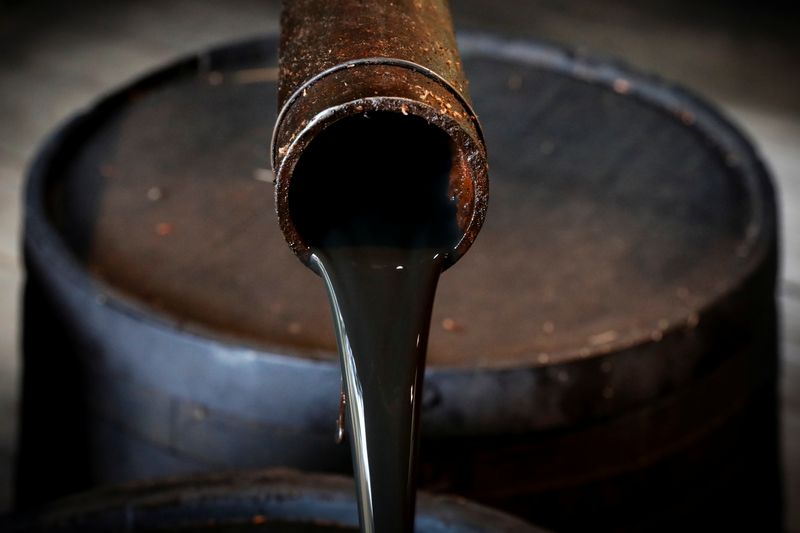
© Reuters. Oil pours out of a spout from Edwin Drake’s original 1859 well that launched the modern petroleum industry at the Drake Well Museum and Park in Titusville, Pennsylvania U.S., October 5, 2017. REUTERS/Brendan McDermid/Files
LCO
+0.15%
Add to/Remove from Watchlist
Add to Watchlist
Add Position
Position added successfully to:
Please name your holdings portfolio
Type:
BUY
SELL
Date:
Amount:
Price
Point Value:
Leverage:
1:1
1:10
1:25
1:50
1:100
1:200
1:400
1:500
1:1000
Commission:
Create New Watchlist
Create
Create a new holdings portfolio
Add
Create
+ Add another position
Close
CL
+0.19%
Add to/Remove from Watchlist
Add to Watchlist
Add Position
Position added successfully to:
Please name your holdings portfolio
Type:
BUY
SELL
Date:
Amount:
Price
Point Value:
Leverage:
1:1
1:10
1:25
1:50
1:100
1:200
1:400
1:500
1:1000
Commission:
Create New Watchlist
Create
Create a new holdings portfolio
Add
Create
+ Add another position
Close
By Alex Lawler
LONDON (Reuters) -Oil weakened on Wednesday, with Brent crude falling close to its lowest this year, pressured by concern about recession and easing fears that a Western cap on Russian oil prices would significantly curb supply.
Warnings from big U.S. banks about a likely recession next year weighed, and supported the U.S. dollar. A stronger dollar makes oil more expensive for holders of other currencies and tends to dampen appetite for risk assets.
Brent crude fell $1.05, or 1.3%, to $78.30 a barrel by 1020 GMT. It touched $77.74 earlier, the lowest since Jan. 3. U.S. crude was down $1.24 or 1.7% to $73.01 and touched $72.25, the lowest since late December.
“There’s still tons of uncertainty in the markets today,” said Claudio Galimberti, senior vice-president at Rystad Energy, adding crude production in Russia may not drop as much as expected earlier.
Brent settled below $80 on Tuesday for the only the second time in 2022 and has unwound the year’s gains, which had lifted prices close to the all-time high of $147 in March after Russia invaded Ukraine.
Fears were easing that the price cap on Russian crude could cause a supply shock. Russia, the Vedomosti daily reported on Wednesday, is considering options including banning oil sales to some countries to counter the cap imposed by Western powers.
“The geopolitical risk premium has all but disappeared, but inflation concerns have not,” oil broker PVM said. “Clearly, investors are not worried the least about any potential supply shortage that might be the result of the price cap and the EU ban on Russian oil sales.”
Some support for prices came from hopes of a Chinese demand recovery.
China announced on Wednesday the most sweeping changes to its anti-COVID regime since the pandemic began, loosening rules that curbed the spread of the virus but hobbled the world’s second largest economy and sparked protests.
Also lending support was Tuesday’s report from industry group the American Petroleum Institute which, according to market sources, said that crude stocks fell by around 6.4 million barrels.
In focus is the latest U.S. supply report from the Energy Information Administration due at 1530 GMT and whether it confirms the large decline in crude stocks. [EIA/S]
(Additional reporting Trixie Yap in Singapore, editing by Jason Neely)
Source: Investing.com




























